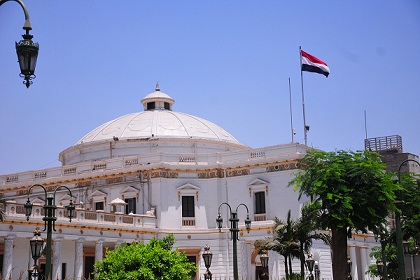
By Hannah Wilkinson
“All of us are one hand
All of us want one thing
Leave, leave, leave, leave
Out, out, Hosni Mubarak”
The power in singer Ramy Essam’s revolutionary ballad Irhal was its simplicity. In the 18 days leading up to the fall of Hosni Mubarak, he played the song in front of millions of protesters, urging them on to victory. The words were shouted back to him by jubilant crowds, united in a common aim. His song gained him worldwide notoriety. He performed in South Africa, the United Kingdom, Sweden, and Germany, and the song was named by Time Out London as the third in the top one hundred most influential songs to have affected humanity.
Song writing does not come as easily to Ramy Essam anymore. He sits cross-legged on the floor of his Dokki studio, unable and unwilling to leave his home and perform. The curfew has prevented him from giving any concerts and the burden of being a poster-boy for the aims and dreams of the 25 January Revolution has made it impossible for him to sum up Egypt’s current situation through his songs.
Essam went out on 30 June hoping for a reprise of the role he played in the 25January uprising. “I just wanted to get rid of the Muslim Brotherhood,” he said, “I wanted a civilian government.”
However instead of rallying expectant crowds, Essam found the atmosphere altogether different. “The people were shouting ‘The people and the army are one hand’. I didn’t sing on the 30th of June,” he said. He only sang twice during the period of upheaval, but found that his once loyal followers were less keen to receive his staunch, civilian message. “The people didn’t react to me and they didn’t understand anything that I said,” he recounted. “ I left the mic and I was shouting to them: We’ll never forget what the military did to our friends and how they killed the martyrs.”
After 3 July Essam returned home and wrote on his Twitter and Facebook pages that there was no longer “space for the real protesters between the killers”. Since then he has been struggling to write a song which sums up how he feels about the situation.
Essam still passionately believes in the power of music to bring about change. “Not only in the Egyptian revolution, in any revolution. It’s an amazing way to describe what we feel and what we want,” he explained. “I have a slogan, for me that the music is the most powerful, peaceful weapon in the world. You can change anything with music.”
But in order to do that, the songwriter has to know what it is they want to change. Although Essam is still committed to the idea of a civilian government, he feels his songs need to reflect the reality of the streets. “From 25 January I gained a big responsibility from the protesters. They learned from my songs. As a singer for the revolution it’s a big responsibility,” he said. However having no political affiliation to either of the two groups out on the street, Essam describes the process of writing the “critical song” as being “very, very difficult.”
Essam wants his song to “show the truth to the next generations,” where he believes the media have let people down. “But till now even for me I don’t yet know one hundred per cent what the truth is,” he said. Essam is still waiting “to know what happened in the wave of 30 June.”
“This is my most important song now,” he affirmed.
The confusion that Essam described might make a return to his role of 25 January difficult. When he speaks of his experiences as the singer of the revolution, it is with an almost wistful nostalgia for a time when the lines of right and wrong were clear and messages could be simple. “You can’t imagine,” he said, “that feeling of singing in front of millions of people protesting against Mubarak, and them singing with you. I will be thankful for that until my last breath.”
Essam was only 23 years old then. Two years later, the revolutionary spirit has soured. “The direction Egypt is going in now is not good for me,” he said. Essam sees 25 January’s aims as being further away than ever. Whichever side triumphs in the current upheavals, Essam said: “We will not live in freedom, we will not find any social equality.” Essam is still hopeful though, vowing to continue fighting. But the nature of the revolution has changed. Do the people on the streets still want Essam’s songs? Has the Revolution left its golden boy behind?



